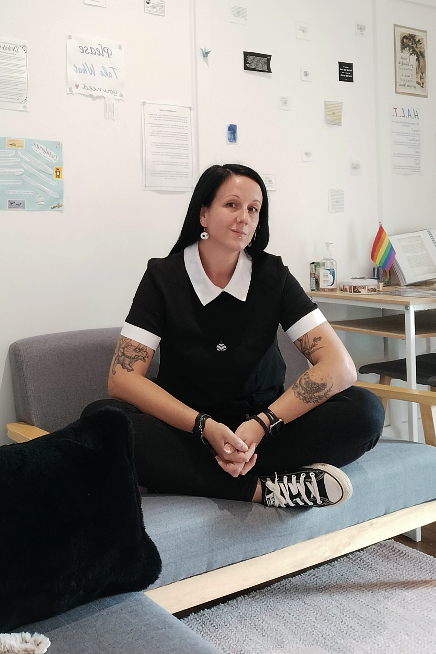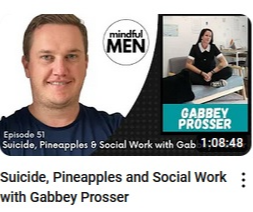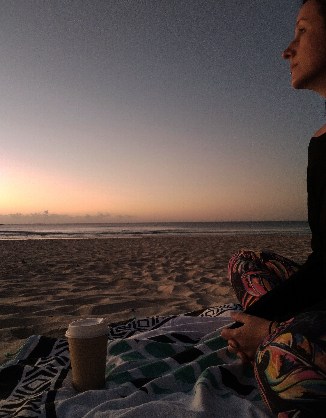
Meet Gabbey
Hi, my name is Gabbey and I am the founder, owner and operator of Hope and Healing Social Work and Counselling. I also created the Take Your Pineapples Out campaign that aims to raise awareness and start gentle conversations about the prickly subject of suicide. I am an accredited mental health social worker and I have been working in the community sector on the Sunshine Coast since 2006.
My career began when I was
employed in a young parents support program as a peer worker in 2006,
I then commenced studying my Bachelor of Social Work at the University of
the Sunshine Coast in 2007. Since
I commenced my career in 2006, I have worked
across many sectors of the community services industry on the Sunshine Coast
and I have been welcomed into the homes, lives and journey's of so
many amazing individuals and families throughout my career.
These humbling experiences of working with individuals at their most vulnerable led me to create my own private practice so that I can tailor my own services and supports to meet the needs of individuals and families that I have seen over my many years of working as a social worker on the Sunshine Coast.
In my time as a social worker I have worked with individuals right across the lifespan from babies and children, to youth and adolescents, adults and our older residents. I have worked with families, pregnant women, single individuals, men, Veterans, First Nations people, and many diverse groups. I have worked with people in the deaf community and individuals from culturally and linguistically diverse backgrounds. In the community I have worked in parenting programs, homelessness services, domestic violence programs, social enterprises, private hospitals, case management roles, and more.
From 2014 I switched my focus from generalist social work programs to focus specifically in working in mental health specific services as this is where my passion truly lies. In working in the area of mental health I have been able to combine all of my past working experiences to be able to provide a holistic mental health service that looks at all aspects of mental illness not just the internal aspects. Having this holistic lens of mental illness enables me to work with individuals to understand the environmental factors that contribute to their experiences and to assist them with these challenges in their journey of recovery and allows me to provide a holistic approach to clinical supervision.
One of the things I pride myself on is that I am good at what I do. My compassion, empathy, understanding, experience and professionalism combined with my down to earth nature means that I build therapeutic relationships easily, and that means that when I work with someone they are able to build trust and confidence in me. I might not use big, academic, language but my practice is fully informed by evidence based processes, knowledge and skills and I genuinely believe I was born to be a social worker. I feels as if it comes natural to me and as that old saying goes "Find a job you love and you will never work a day in your life" and that is why I feel, if you choose to access clinical supervision or attend any training and workshops through Hope and Healing Social Work and Counselling, you will find benefit in our work together because, to me, this isn't a job, it's a passion.
About Hope and Healing Social Work and Counselling
Gabbey believes that sometimes, to overcome the challenges that working in the human services industry can throw at you, we need a support tribe around us, though sometimes tribes are not that easy to find. So part of the holistic service that is provided here at Hope and Healing Social Work and Counsellng Service involves exploring with you any other supports and services you might to help you maintain longevity in your role and journey, and Gabbey can be one of those external supports in your tribe.
To find out more about Gabbey and her journey into social work, listen to her chat with Simon Rinne on his Mindful Men podcast. You can listen by searching Mindful Men on your favourite podcast platform, or watch on YouTube by clicking the link below:

Therapeutic Interventions
Gabbey is trained in a range of evidence based therapeutic interventions and that she combines into a holistic model of therapeutic support to ensure that all individuals that she works with have access to clinical supervision and training that is informed by evidence based practices and that can be tailored to their specific individual needs in a variety of different fields of practice. Some of the therapeutic interventions that Gabbey is trained in include:
Exposure Therapy Sensory Interventions EMDR - Trauma Processing Acceptance and Commitment Therapy (ACT) Mindfulness Cognitive Behavioural Therapy (CBT)
|
|
Trauma Informed Practice
Anger Management Circle of Security (CoSP) Attachment model Narrative Therapy Core Sensitivities Trauma Informed Practice Motivational Interviewing
|

What is an Accredited Mental Health Social Worker?
An Accredited Mental Health Social Worker is someone who has studied as a social worker at University and then specialised in the field mental health. In order to become accredited, and to maintain accreditation, a social worker needs to engage in two years full time equivalent post graduate work in a mental health setting whilst completing specific mental health continuing professional development and clinical supervision.
Social workers then need to go through a strict application process with the Australian Association of Social Workers in order to obtain mental health accreditation. Accredited Mental Health Social Workers are recognised by the Federal Government as having specialist mental health expertise and an ability to provide clinical psychological interventions under Government services such as Medicare and Department of Veterans Affairs.
People often ask how an Accredited Mental Health Social Worker differs to a psychologist and my explanation is that psychology looks a lot at the science relating to the individual, the brain, specific mental health conditions, and symptomology. Accredited Mental Health Social Workers are also trained in these areas but on top of that, the foundation of their training is understanding the environmental factors (external to the individual) that can impact on people and their mental health and wellbeing. Often by working on the externals factors, individuals can see improvements in their mental health and can understand that there is nothing ‘wrong’ with them – it was the environment that they were living in/with, which can be quite empowering and help with shifting the narrative of ‘shame’ that many people live with.

Why the Origami Crane?
The
origami crane is one of beautiful symbology that has developed out of
traditional Japanese culture. In Japan the crane is a symbolic bird
and is believed to live for 1000 years and it represents many things
including good health, longevity and good luck. The making of origami
cranes has been dated back to 16th century Japan and in Japanese
culture it is a belief that if you make 1000 paper cranes you will be
granted a wish. The most famous story of the 1000 paper cranes is of Sadako
Sasaki who was 2 years old when the atomic bomb was dropped at Hiroshima. At the
age of 11 Sadako was diagnosed with Leukemia as a result of the
radiation exposure from the atomic bomb. During her time in hospital
Sadako commenced making 1000 origami cranes so that she could become well
and make a wish. Unfortunately she lost her life at the age of 12 less
than a year after her diagnosis. In more recent Japanese culture the
origami crane has also come to symbolise peace and resilience, as well
as hope and healing during challenging times.
After the September 11 attacks,
Sadako's, now elderly, brother gave
one of her handmade origami cranes to the
World Trade Visitor's Centre - it was given to the very country that dropped the atomic bomb.
It was to symbolise peace, hope and healing and to say that the world would be a better place if we all worked together.
When trying to think of a name for my private practice I knew I wanted to use the symbol of the origami crane, so why not use the meaning behind it for the name "Hope and Healing"
- Gabbey

Hope and Healing Social Work and Counselling Values
Connection:
As humans
we are hardwired for connection. We come into this world 100% dependent on
connection for survival. Sometimes there are ruptures in that early connection
that impact on and shape our future connections and the way in which we relate
to others. At Hope and Healing Social Work and Counselling, repairing ruptured
connections or working on building new connections is a fundamental part
of the healing work that we will do.
Empowerment: So
often in life it can feel like there are so many situations that are out of our
control. This can lead to feeling powerless. The more this happens the more we
can tend to give over our power and feel like we have no power. Here at Hope
and Healing Social Work and Counselling I firmly believe we all have the
capacity to have power and control in any situation, it is just about finding
the way to gain it. I work from a model of empowering people to help them find
their inner strength.
Reliability & Trust: I pride myself on my reliability. If I say I am going to do something I will do it, if I book an appointment with you I will keep it. Obviously sometimes, circumstances beyond my control such as sickness will arise and I will need to cancel, however aside from that I am always true to my word. By being true to my word that will also help you to build trust in me and maybe I will be the first person you have been able to build trust in and I know for many people that is not an easy thing.
Commitment: am 100% committed to every individual that I work with and I am so passionate about Hope and Healing Social Work and Counselling and the effectiveness of the support and services that I provide. That is why I choose not to bulk bill, because I also ask individuals who attend counselling with me to make a commitment to invest in themselves. I am committed to providing affordable rates so that individuals at all income levels have access to quality counselling that they can commit to as much as I do.
